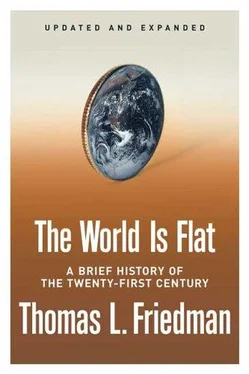Said Google cofounder Russian-born Sergey Brin, “If someone has broadband, dial-up, or access to an Internet cafe, whether a kid in Cambodia, the university professor, or me who runs this search engine, all have the same basic access to overall research information that anyone has. It is a total equalizer. This is very different than how I grew up. My best access was some library, and it did not have all that much stuff, and you either had to hope for a miracle or search for something very simple or something very recent.” When Google came along, he added, suddenly that kid had “universal access” to the information in libraries all over the world.
That is certainly Google's goal-to make easily available all the world's knowledge in every language. And Google hopes that in time, with a PalmPilot or a cell phone, everyone everywhere will be able to carry around access to all the world's knowledge in their pockets. “Everything” and “everyone” are key words that you hear around Google all the time. Indeed, the official Google history carried on its home page notes that the name “Google” is a play on the word “'googol,' which is the number represented by the numeral I followed by 100 zeros. Google's use of the term reflects the company's mission to organize the immense, seemingly infinite amount of information available on the Web,” just for you. What Google's success reflects is how much people are interested in having just that-all the world's knowledge at their fingertips. There is no bigger flattener than the idea of making all the world's knowledge, or even just a big chunk of it, available to anyone and everyone, anytime, anywhere.
“We do discriminate only to the degree that if you can't use a computer or don't have access to one, you can't use Google, but other than that, if you can type, you can use Google,” said Google CEO Eric Schmidt. And surely if the flattening of the world means anything, he added, it means that “there is no discrimination in accessing knowledge. Google is now searchable in one hundred languages, and every time we find another we increase it. Let's imagine a group with a Google iPod one day and you can tell it to search by voice-that would take care of people who can't use a computer-and then [Google access] just becomes about the rate at which we can get cheap devices into people's hands.”
How does searching fit into the concept of collaboration? I call it “in-forming.” In-forming is the individual's personal analog to open-sourcing, outsourcing, insourcing, supply-chaining, and offshoring. Informing is the ability to build and deploy your own personal supply chain-a supply chain of information, knowledge, and entertainment. In-forming is about self-collaboration-becoming your own self-directed and self-empowered researcher, editor, and selector of entertainment, without having to go to the library or the movie theater or through network television. In-forming is searching for knowledge. It is about seeking like-minded people and communities. Google's phenomenal global popularity, which has spurred Yahoo! and Microsoft (through its new MSN Search) also to make power searching and in-forming prominent features of their Web sites, shows how hungry people are for this form of collaboration. Google is now processing roughly one billion searches per day, up from 150 million just three years ago.
The easier and more accurate searching becomes, added Larry Page, Google's other cofounder, the more global Google's user base becomes, and the more powerful a flattener it becomes. Every day more and more people are able to in-form themselves in their own language. Today, said Page, “only a third of our searches are U.S.-based, and less than half are in English.” Moreover, he added, “as people are searching for more obscure things, people are publishing more obscure things,” which drives the flattening effect of in-forming even more. All the major search engines have also recently added the capability for users to search not only the Web for information but also their own computer's hard drive for words or data or e-mail they know is in there somewhere but have forgotten where. When you can search your own memory more efficiently, that is really in-forming. In late 2004, Google announced plans to scan the entire contents of both the University of Michigan and Stanford University Libraries, making tens of thousands of books available and searchable online.
In the earliest days of search engines, people were amazed and delighted to stumble across the information they sought; eureka moments were unexpected surprises, said Yahool's cofounder Jerry Yang. “Today their attitudes are much more presumptive. They presume that the information they're looking for is certainly available and that it's just a matter of technologists making it easier to get to, and in fewer keystrokes,” he said. “The democratization of information is having a profound impact on society. Today's consumers are much more efficient-they can find information, products, services, faster [through search engines] than through traditional means. They are better informed about issues related to work, health, leisure, etc. Small towns are no longer disadvantaged relative to those with better access to information. And people have the ability to be better connected to things that interest them, to quickly and easily become experts in given subjects and to connect with others who share their interests.”
Google's founders understood that by the late 1990s hundreds of thousands of Web pages were being added to the Internet each day, and that existing search engines, which tended to search for keywords, could not keep pace. Brin and Page, who met as Stanford University graduate students in computer science in 1995, developed a mathematical formula that ranked a Web page by how many other Web pages were linked to it, on the assumption that the more people linked to a certain page, the more important the page. The key breakthrough that enabled Google to become first among search engines was its ability to combine its PageRank technology with an analysis of page content, which determines which pages are most relevant to the specific search being conducted. Even though Google entered the market after other major search players, its answers were seen by people as more accurate and relevant to what they were looking for. The fact that one search engine was just a little better than the others led a tidal wave of people to switch to it. (Google now employs scores of mathematicians working on its search algorithms, in an effort to always keep them one step more relevant than the competition.)
For some reason, said Brin, “people underestimated the importance of finding information, as opposed to other things you would do online. If you are searching for something like a health issue, you really want to know; in some cases it is a life-and-death matter. We have people who search Google for heart-attack symptoms and then call nine-one-one.” But sometimes you really want to in-form yourself about something much simpler.
When I was in Beijing in June 2004, I was riding the elevator down one morning with my wife, Ann, and sixteen-year-old daughter, Natalie, who was carrying a fistful of postcards written to her friends. Ann said to her, “Did you bring their addresses along?” Natalie looked at her as if she were positively nineteenth-century. “No,” she said, with that you-are-so-out-of-it-Mom tone of voice. “I just Googled their phone numbers, and their home addresses came up.”
Address book? You dummy, Mom.
All that Natalie was doing was in-forming, using Google in a way that I had no idea was even possible. Meanwhile, though, she also had her iPod with her, which empowered her to in-form herself in another way— with entertainment instead of knowledge. She had become her own music editor and downloaded all her favorite songs into her iPod and was carrying them all over China. Think about it: For decades the broadcast industry was built around the idea that you shoot out ads on network television or radio and hope that someone is watching or listening. But thanks to the flattening technologies in entertainment, that world is quickly fading away. Now with TiVo you can become your own TV editor. TiVo allows viewers to digitally record their favorite programs and skip the ads, except those they want to see. You watch what you want when you want. You don't have to make an appointment with a TV channel at the time and place someone else sets and watch the commercials foisted on you. With TiVo you can watch only your own shows and the commercials you want for only those products in which you might be interested.
Читать дальше












